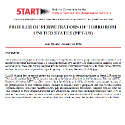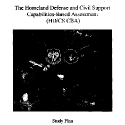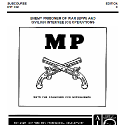DHS-University of Maryland Study: Profiles of Perpetrators of Terrorism – United States (PPT-US)
July 9, 2012 in Department of Homeland Security, Maryland
 The objective of this project is to create and manage a
comprehensive dataset of groups and movements that have used terrorist
tactics within the United States – at some point between 1970 and 2007 –
to achieve political, religious, social or economic goals. These data
will be integrated into the Terrorist and Extremist Violence in the
United States (TEVUS) database in the near future as part of the larger
Integrating U.S. Security Databases (IUSSD) project.
The objective of this project is to create and manage a
comprehensive dataset of groups and movements that have used terrorist
tactics within the United States – at some point between 1970 and 2007 –
to achieve political, religious, social or economic goals. These data
will be integrated into the Terrorist and Extremist Violence in the
United States (TEVUS) database in the near future as part of the larger
Integrating U.S. Security Databases (IUSSD) project.U.S. Northern Command Homeland Defense/Civil Support Capabilities Assessment Study Plan
July 9, 2012 in U.S. Northern Command
 This Study Plan outlines the background, scope, strategic
assumptions, study objectives, analysis methodology, scenario
considerations, timeline, and management responsibilities in conducting
the Homeland Defense and Civil Support Capabilities-based Assessment
(HD/CS CBA) to include production of the Functional Area Analysis (FAA),
Functional Needs Analysis (FNA) and a Joint Capabilities Document
(JCD). This CBA, through the execution of the FAA, FNA. And JCD;
identifies, describes, documents, and prioritizes DOD’s capability gaps
and excesses in the HD/CS mission areas (to include the Mission
Assurance (MA) function).
This Study Plan outlines the background, scope, strategic
assumptions, study objectives, analysis methodology, scenario
considerations, timeline, and management responsibilities in conducting
the Homeland Defense and Civil Support Capabilities-based Assessment
(HD/CS CBA) to include production of the Functional Area Analysis (FAA),
Functional Needs Analysis (FNA) and a Joint Capabilities Document
(JCD). This CBA, through the execution of the FAA, FNA. And JCD;
identifies, describes, documents, and prioritizes DOD’s capability gaps
and excesses in the HD/CS mission areas (to include the Mission
Assurance (MA) function).U.S. Army Military Police School Enemy Prisoner of War and Civilian Internee Policy and Operations Courses
July 8, 2012 in U.S. Army
 As a military police supervisor, you may become involved with
EPW/CI operations in a variety of ways. The Army Military Police have
the primary responsibility for EPW/CI operations for the Department of
Defense. In any form of hostilities in which the United States is
involved, persons that are captured or surrender who cannot be readily
classified will be treated as EPW/CI until such time as they are
reclassified by competent authority. This includes low intensity
conflicts, as well as declared wars. In some cases, you may find
yourself as an advisor to other countries. You will be expected to
encourage those whom you are advising to afford the same treatment to
their prisoners.
As a military police supervisor, you may become involved with
EPW/CI operations in a variety of ways. The Army Military Police have
the primary responsibility for EPW/CI operations for the Department of
Defense. In any form of hostilities in which the United States is
involved, persons that are captured or surrender who cannot be readily
classified will be treated as EPW/CI until such time as they are
reclassified by competent authority. This includes low intensity
conflicts, as well as declared wars. In some cases, you may find
yourself as an advisor to other countries. You will be expected to
encourage those whom you are advising to afford the same treatment to
their prisoners.
No comments:
Post a Comment